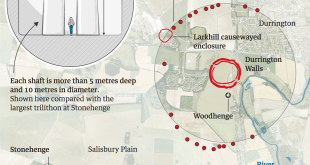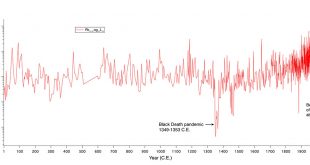Part I can be found here Claudio Grass (CG): Overall, apart from the obvious economic consequences of the crisis, do you also see geopolitical and social ones, on a wider scale? Given all these “moving parts”, from the upcoming US election and internal frictions in the EU to the Hong Kong tensions and the rising public discontent in Latin America, where do expect the chips to fall once this is over? Jayant Bhandari (JB): What I have told you about India to a large extent also...
Read More »Durrington Shafts
Stonehenge is tiny. Dalya Alberge reports in the Guardian.
Read More »Interest Rates Since 1310
Figure III in Paul Schmelzing (2019), Eight Centuries of Global Real Interest Rates, R-G, and the ‘Suprasecular’ Decline, 1311–2018. SSRN.
Read More »Liechtenstein’s 300-Year-Anniversary Trail
In the New York Times, John Henderson reports about a new hiking trail in Liechtenstein that was opened to mark the country’s 300-year anniversary. This Cross-Country Hike Took 5 Days. That’s Going the Long Way. According to Lonely Planet, the trail makes Liechtenstein one of the top European travel destinations in 2019.
Read More »Yuval Noah Harari’s “Sapiens—A Brief History of Humankind”
Homo appeared roughly 2 million years ago in Africa and Homo sapiens roughly 200’000 years ago in East Africa. Harari divides his account of the last 70’000 years into four parts: The cognitive revolution (language), the agricultural revolution (about 10’000 years ago in today’s Turkey, Iran, Levant), the unification of humankind (through money, empire, and religion), and the scientific revolution. According to Harari, Sapiens developed more efficient strategies for cooperation than other...
Read More »Yuval Noah Harari’s “Sapiens—A Brief History of Humankind”
Homo appeared roughly 2 million years ago in Africa and Homo sapiens roughly 200’000 years ago in East Africa. Harari divides his account of the last 70’000 years into four parts: The cognitive revolution (language), the agricultural revolution (about 10’000 years ago in today’s Turkey, Iran, Levant), the unification of humankind (through money, empire, and religion), and the scientific revolution. According to Harari, Sapiens developed more efficient strategies for cooperation than other...
Read More »How Switzerland Became Multilingual
In the NZZ, Christophe Büchi reports how Switzerland became a multilingual country. Immigration occurred in waves; sometimes the immigrants adjusted more, sometimes less.
Read More »How Switzerland Became Multilingual
In the NZZ, Christophe Büchi reports how Switzerland became a multilingual country. Immigration occurred in waves; sometimes the immigrants adjusted more, sometimes less.
Read More »The Reformation, Education, and Secularization
In a paper, Davide Cantoni, Jeremiah Dittmar, and Noam Yuchtman argue that the Protestant reformation after the year 1517 triggered major reallocation, due to religious competition and political economy. [T]he Reformation produced rapid economic secularization. … shift in investments in human and fixed capital away from the religious sector. Large numbers of monasteries were expropriated … particularly in Protestant regions. This transfer of resources shifted the demand for labor...
Read More »The Black Death and Atmospheric Lead Concentration
During the black death epidemic (1349–1353), atmospheric lead concentration collapsed as mining ceased. This is the result of a study by Alexander More, Nicole Spaulding, Pascal Bohleber, Michael Handley, Helene Hoffman, Elena Korotkikh, Andrei Kurbatov, Christopher Loveluck, Sharon Sneed, Michael McCormick, and Paul A. Mayevski on lead levels in an Alpine glacier. They write that [c]ontrary to widespread assumptions, … resolution analyses of an Alpine glacier reveal that true historical...
Read More » Swiss Economicblogs.org
Swiss Economicblogs.org


